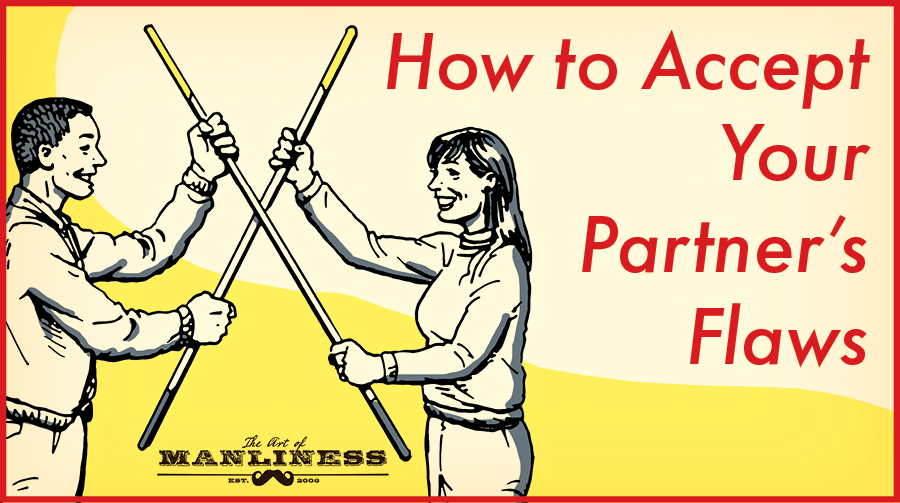As the relationship goes on, the pair may remain very much in love, but their respective idiosyncrasies can become a source of perennial conflict. Each partner wants the other to change X behavior, and each partner, even if they try to make the requested change, frequently fails at doing so. And the conflict continues.
Such failures can often cause one partner to feel great disappointment, and even contempt for the other. “If she really loved me,†he thinks, “she would change.†Yet changing a deeply ingrained behavior can be almost impossible; the disappointed party should ask how successfully he himself has been at changing one of his deeply set personality traits. Probably not very. Indeed, research shows that nearly 70% of marital conflicts are perpetual and unresolvable — they last a couple’s whole life through.
The only alternative to the typically fruitless hope of getting one’s partner to change, is to simply accept that they’re never going to. To accept their idiosyncrasies as a part of their, and your, life. Yet this can seem like its own quixotic quest; someone can desire to accept their significant other’s flaws, and yet truly struggle to move this sense of acceptance from their head to their heart.
Let me suggest a paradigm that I think is most helpful in making this mindset shift. Through it, you can come to not only accept your partner’s “flaws,†but even appreciate them.
We typically think of the things we love about our partner, and the things we dislike, as being sorted into two very separate categories. The reality, however, is that they’re often inextricably linked. They’re two sides of the same pole of energy — one a “light†side, the other a “shadow†side.
A wife loves that her husband is a man’s man, who’s rugged and stoic and makes her feel safe, but she dislikes that he isn’t more empathetic and emotionally expressive. The energy that fuels his very masculine side, however, is the same that inhibits his tenderness.
A husband loves that his wife is artistic and creative, but he dislikes how flaky she is about keeping plans. The energy that gives her that more esoteric side, however, is the same one that makes her mind a little more spontaneous and scattered.
The same energy that creates the side of someone that you love, is frequently also responsible for the side that drives you crazy. You thus shouldn’t pine for an impossible scenario where you can retain that which you adore, and excise the part you do not; you can’t pick up one end of the stick, without picking up the other! Once you recognize that someone’s flaws are just a different manifestation of the same energy in them that you love, these faults become easier to accept.
For example, Kate really struggles with being on time — she’s perennially late for most everything. She likes the rush of cutting it close — of trying to beat the clock. I’m someone who likes to be punctual, however, so this tendency of hers can bug me — especially when it comes to catching a flight! She wants to get to the airport without a minute to spare, while I’m 100% what we affectionately call “Nervous Travel Dad.†Yet, I don’t let Kate’s lack of punctuality bother me too much, because I recognize that it’s driven by the same excitement-seeking aspect of her personality that adds a great dash of fun and adventure to our lives, and which I love. I recognize they’re just two sides of the same coin, and I treasure that coin.
On the other hand, my struggle with depression and having a melancholy, mercurial disposition can be difficult on Kate. It would be easier on our relationship if I was consistently in a good mood every day. But, Kate recognizes that without this serious streak in my personality, I wouldn’t be the person she loves. She sees my melancholic and pessimistic disposition as just the other end of a pole that also makes me more conscientious and empathetic, and less flighty and shallow. And she thinks it’s ultimately been good for AoM, setting a steady tone and keeping it from falling into the traps of effervescent, hype-driven promises, rah-rah platitudes, and goofy Instagram influencer posturing that so readily plague many “lifestyle brands.â€
This isn’t to say that you must accept a person’s flaws 100%. Sometimes they’re not tied to anything really positive, or the negative effect a certain energy can have on the relationship can outweigh its positive impact.
While it’s generally unreasonable to expect anyone to fundamentally change their essential personality traits — a task which is nearly impossible to do — you can reasonably expect your partner to mitigate their downsides a bit. To rub off their sharper edges.
So for example, Kate really tries to be on time (or at least only a tiny bit late) for something that’s important to me/us. And I do my best to keep a leash on the black dog of my depression.
Ultimately, once you realize that the parts of a person you dislike simply come along with the parts you adore, and that you wouldn’t cut out the energy that drives the latter in order to resolve the former, it’s much easier to accept and even celebrate one’s romantic partner (and friends for that matter) for who they are. When you pick up one end of the stick, you pick up the other, and if it’s a good one, you hold onto it and don’t let it go.



